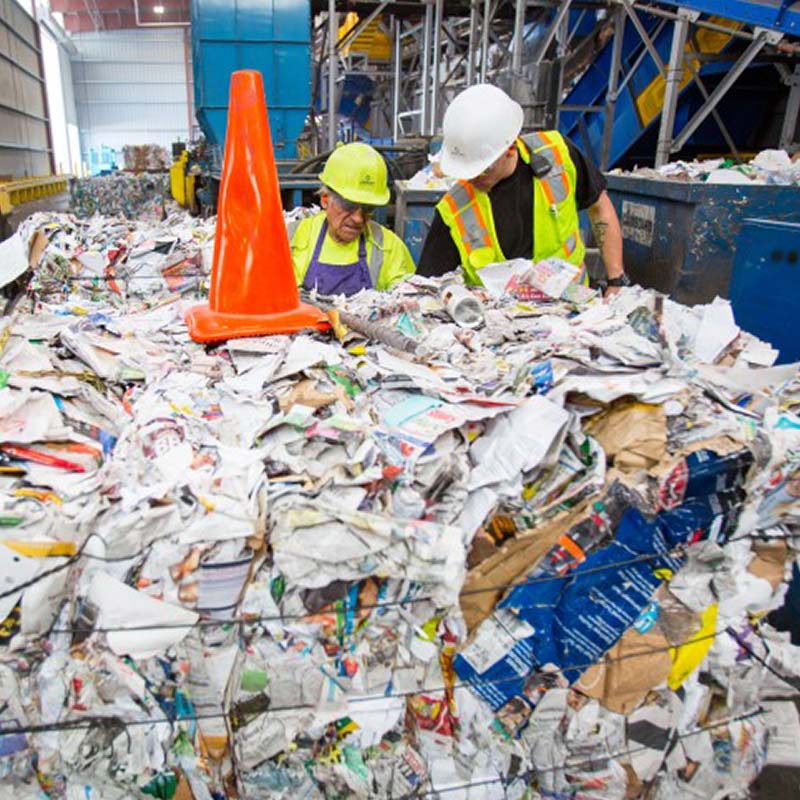When one of the largest recycling facilities in the country needed help to reduce turnover and motivate their team for higher productivity, they turned to Leadpoint. Ten years ago. And we’re still on the job, through challenges like recruiting low-wage workers in a state with a high cost of living and retrofitting the MRF with new equipment.
We’ve stood the test of time for two reasons:
- the customer’s leadership sees value in our recycling expertise and knowledge
- they recognize that a workforce partner that can reduce chaos and help them achieve their goals is a partner they can trust for the long haul.
At this site, which is a fairly typical of the MRFs Leadpoint supports, we put our industry experience to the test to manage employees, projects, timelines and budgets in a way that mitigates the kind of turmoil that can reduce productivity.
How Leadpoint Helped
We don’t treat the employees like “temps.”
Leadpoint recruits and employs the MRF workforce on a full-time basis, not as “temps.” Our sorter jobs give people an opportunity to make an honest living and learn a transferrable skill. They also offer the chance to move up from sorter to line lead and beyond.
“We provide good job opportunities to people who other companies may have overlooked, people who need a fresh start,” said Saul Diaz, Leadpoint director of operations.
“We don’t look to hire ‘temps’,” he explained. “We look for people who have leadership qualities, aren’t afraid to voice their opinion, and are listened to by their peers. It takes more than knowledge of the operation,” he said. “We seek out people who will take the initiative to lead the workforce and then move them up the career ladder.”
Leadpoint also works with its customers to pay a competitive wage and to foster a positive environment with the site’s union membership.
Meeting the Wage Challenge
Increasing wages for MRF employees can be a tough sell. What we’ve found is that higher wages for sorters, line leads and other general labor positions at a MRF lead to a net improvement on the bottom line.
At this large site in California, we worked with the customer’s management team to raise the hourly wage. The resulting performance improvements allowed us to reduce the size of the workforce by 20 percent, cut the work week from six days to five, and lower the overall payroll burden. And, the quality of the material product improved.
These steps contributed to the recovery of several hundred thousand dollars annually in expenses and lost profits.
There are three reasons there’s a connection between higher wages and increased productivity.
- A higher pay rate allows Leadpoint to recruit and retain a higher caliber of employee. The savings that come from reduced turnover and improved performance offset the initial cost of the wage increase and add long-term value through less overtime and higher quality output.
- More competitive wages are motivating to employees and create a more loyal workforce. Engaged workers stay on the job longer and recommend their job to others. That means less time spent on safety issues, onboarding and retraining.
- When employees believe they are treated fairly, respected and valued for their contribution, they work harder and become more productive. We’ve seen this translate to improved production, faster picks, lower contamination levels, less equipment down-time, and better diversion rates.
Installing New Equipment
When Leadpoint’s customer installed new equipment, the site shut down for several weeks. Most of the MRF employees were placed in other jobs or left. When it came time to start back up, Leadpoint had to hire from zero, train a new group of sorters and line leads, and deliver immediate value. It could have been a recipe for an expensive disaster. But it wasn’t.
“To fill the gap, our leadership team worked the line. We cleaned screens, sorted, and kept things going,” said Diaz. “The client’s respect for us grew during this process.
“And, that hands-on experience gave us first-hand insight about how to deploy the workforce and maximize their effort on the new equipment,” he said. “It added to Leadpoint’s overall body of knowledge about MRF operations.”
Strong Relationships, Now and Then
After more than 10 years, Leadpoint maintains a trusting, strong relationship with this customer and their complex recycling facility and receives very positive feedback for their efforts.
- We employ 170 high-performing employees on two shifts.
- The workforce is stable, with an average tenure of more than three years.
- Leadpoint outpaces the customer’s workforce 10:1.
“We’ve had a lot of ups and downs over the years, but we’re proud to be part of the team that’s been instrumental in this site’s success,” Diaz said. “We encourage shared learning and growth opportunities for our employees and our managers.”
About Leadpoint
Since 2000, Leadpoint has helped companies in the waste and recycling industry make better decisions about how to maximize their workforce to reduce chaos, improve productivity, and increase profitability. Based in Phoenix, the company provides its data-driven approach for optimizing performance to organizations nationwide. www.leadpointusa.com


I’m interested to lead point jobs
Hi – it looks like you are interested in applying for work with Leadpoint. To apply, go to leadpointusa.com. Click on the Apply button on the upper right to find a job you’re interested in and then apply. If you have any questions, you can call our recruiting department at 855-802-1741. We look forward to hearing from you!